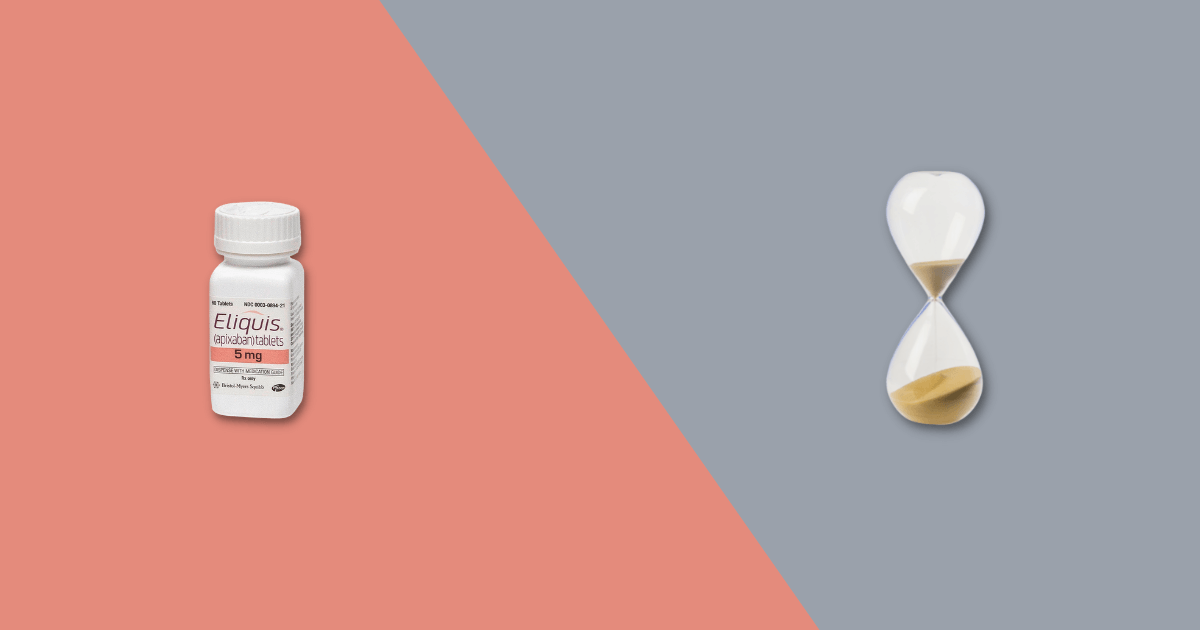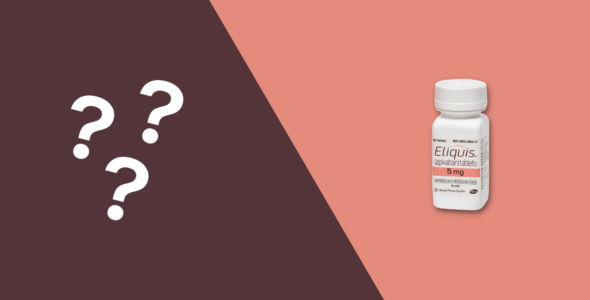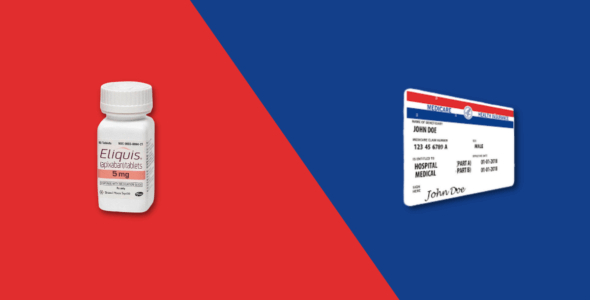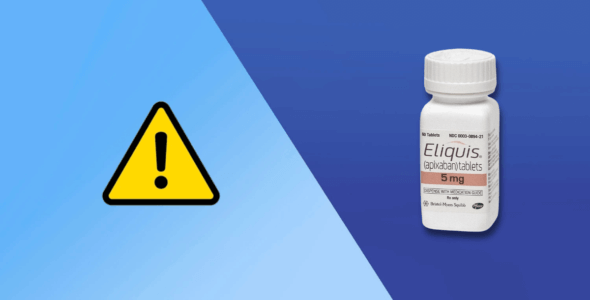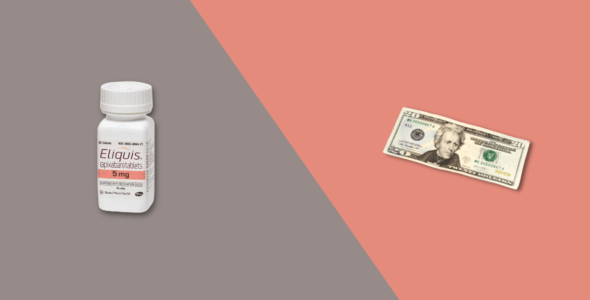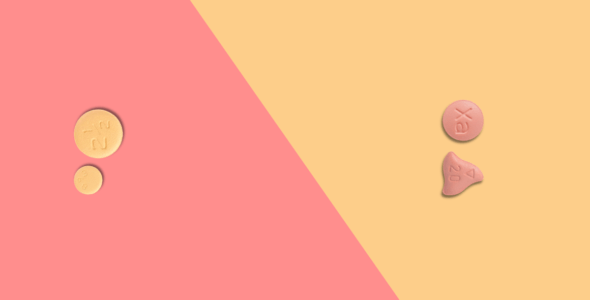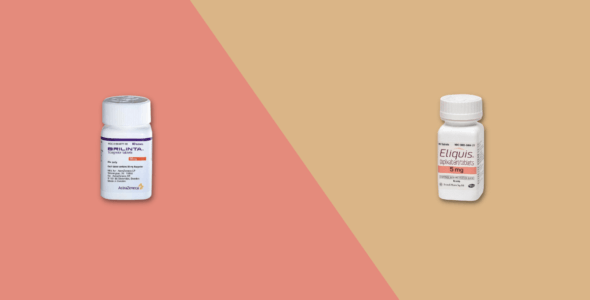How long does Eliquis stay in your system?
Table of contents
- What is Eliquis?
- What does it mean if you have a clot in your blood?
- What is Eliquis used for?
- How does Eliquis work?
- How long does it take for Eliquis to get into your system?
- How long does Eliquis stay in your system?
- How long does it take for Eliquis to leave your system?
- How long does it take for blood thinners to wear off?
- What is the difference between Eliquis and other blood thinners?
- How is Eliquis cleared from the body?
- Can you take Eliquis if you have a stomach ulcer?
- When should I stop Eliquis?
- What happens when you stop taking Eliquis?
- Can you stop Eliquis cold turkey?
- How long do you need to wait before taking Eliquis again?
- What happens if you take Eliquis and are allergic to it?
- What are the side effects of Eliquis?
- How long do Eliquis's side effects last?
- What are the risks of long-term use of Eliquis?
- Does Eliquis have drug interactions similar to warfarin (Coumadin)?
- How do I take Eliquis?
Eliquis is the brand name for a prescription drug that contains apixaban as the active ingredient. Apixaban is classed as an anticoagulant medication and is used to reduce the risk of blood clots forming in the body due to a variety of medical conditions in adults. Blood clots are semi-solid clumps of red blood cells, fibrin, platelets, and other proteins.
If your doctor has prescribed Eliquis to you, you may want to know more about what it is and how it works. Here we’ll explain what Eliquis is, what it’s used for, how it works, its side effects, drug interactions, and more.
What is Eliquis?
Eliquis is an FDA (U.S. Food and Drug Administration) approved medication manufactured by Bristol-Myers Squibb and Pfizer for adults 18 years and older. The safety and efficacy of Eliquis in children and adolescents below age 18 have not been established.
RELATED: What is Eliquis?
What does it mean if you have a clot in your blood?
Blood clotting is a complex process that helps prevent excessive bleeding when a blood vessel is injured. Sometimes blood clots form in your body when they are not needed, which can block the flow of blood and lead to stroke or heart attack.
What is Eliquis used for?
Eliquis is a clotting factor inhibitor that stops your blood from clotting. It is approved to treat the following:
- Reduce the risk of stroke and systemic embolism in patients with nonvalvular atrial fibrillation (AFib)
- Prophylaxis of deep vein thrombosis (DVT), which may lead to pulmonary embolism (PE), in patients who have undergone hip or knee replacement surgery
- Treatment for the prevention of venous thromboembolism (VTE), and for the reduction in the risk of recurrent DVT and PE following initial therapy
How does Eliquis work?
Blood clotting involves the coagulation cascade and platelet activation process that helps prevent excessive bleeding when a blood vessel is injured. Apixaban the active ingredient in Eliquis reduces the likelihood of clots forming in your blood. It works by blocking an enzyme in your blood called factor Xa, which plays an important part in the blood clotting process. By blocking this enzyme, it reduces your risk of blood clots forming.
How long does it take for Eliquis to get into your system?
Eliquis achieves maximum levels in your body within 3 to 4 hours of being taken orally. The effects of Eliquis on blood clotting factors are seen within a few hours.
How long does Eliquis stay in your system?
Eliquis has a half-life of around 12 hours and will remain in your system for around 24 hours after your last dose.
How long do other blood thinners stay in your system?
The amount of time other blood thinners stay in your system depends on the medication, and may range from hours to days. For example, the effects of blood thinning with Plavix (clopidogrel), aspirin and warfarin can last for days, while the effects of blood thinning with Xarelto (rivaroxaban) and Eliquis (apixaban) typically wear off in around one day.
How long does it take for Eliquis to leave your system?
Eliquis will take around 24 hours for its clotting effects to wear off and completely leave your system.
How long does it take for blood thinners to wear off?
This will depend on the blood thinner you have been taking. Blood thinners such as warfarin or clopidogrel may take a few days. Eliquis and Xarelto on the other hand will wear off in around 24 hours.
What is the difference between Eliquis and other blood thinners?
In comparison to warfarin, Eliquis causes less episodes of bleeding, does not require regular blood tests for the INR, has less drug interactions, and is not affected by the intake of vitamin K.
How is Eliquis cleared from the body?
Eliquis is cleared from the body through the liver, kidneys, intestine, and through metabolism.
Can you take Eliquis if you have a stomach ulcer?
You are not advised to take Eliquis if you have a stomach ulcer as you will be at an increased risk of bleeding from the ulcer and Eliquis may increase this risk.
When should I stop Eliquis?
Treatment with Eliquis should be stopped one or two days before surgery or any dental procedure. Speak to your doctor for medical advice if you are thinking about stopping your Eliquis.
What happens when you stop taking Eliquis?
If you discontinue treatment with Eliquis you will be at an increased risk of heart attacks, DVT, strokes, or pulmonary embolism after around 24 hours.
Can you stop Eliquis cold turkey?
Eliquis does not cause withdrawal symptoms but if you stop treatment too early, you are at an increased risk of cardiovascular problems, such as heart attack or stroke.
How long do you need to wait before taking Eliquis again?
Eliquis is taken twice daily (every 12 hours). Speak to your doctor for medical advice about how to take Eliquis.
What happens if you take Eliquis and are allergic to it?
Your doctor will decide if you should continue to take Eliquis if you have had an allergic reaction. If you have had a serious allergic reaction speak to your healthcare provider right away or call 911 for emergency help.
What are the side effects of Eliquis?
The most common side effects of Eliquis in clinical trials include:
- Back pain
- Bruising
- Heavy menstrual bleeding
- Nosebleeds
- Bleeding gums
In rare instances, Eliquis can cause more serious side effects. These can include:
- Major bleeding which can cause serious and life-threatening.
- Spinal or epidural hematoma (bleeding around your spine)</li
- Tarry stools
- Vomiting blood or your vomit looks like coffee grounds
- Red, pink, or brown urine, red or black stools
- Allergic reaction (hives, chest pain, wheezing, trouble breathing, swelling of your face, lips)
Your doctor will assess the benefits of using Eliquis against your risk of side effects. Make sure to read the full prescribing information, including the boxed warnings and the medication guide to learn more about this medication.
Patients are encouraged to report negative side effects or adverse reactions of Eliquis to the FDA. Visit www.fda.gov/medwatch, or call 1-800-FDA-1088.
RELATED: Eliquis side effects and how to avoid them, Side effects of Eliquis in the elderly
How long do Eliquis’s side effects last?
Side effects should pass after a couple of days to a few weeks. Speak to your doctor for medical advice if side effects continue after this time.
What are the risks of long-term use of Eliquis?
Discuss your medical condition with your doctor before starting treatment with Eliquis, as treatment with Eliquis may worsen certain conditions such as if you:
- Have active pathological bleeding
- Are taking any of the medications that could interact with Eliquis
- Are breastfeeding or are planning to breastfeed
- Are pregnant or plan to become pregnant. Eliquis should be used with caution in pregnant women due to the potential for pregnancy-related hemorrhage.
- Have an artificial heart valve
- Have Triple Positive Antiphospholipid Syndrome.
- Have an intrathecal catheter
- Have kidney or liver problems
- Have bleeding problems or any other medical condition that increases your bleeding risk
Does Eliquis have drug interactions similar to warfarin (Coumadin)?
Eliquis (apixaban), Xarelto (rivaroxaban), and Pradaxa (dabigatran) are low risk for drug interactions compared to older, high-risk anticoagulants such as warfarin. You will however have a higher risk of bleeding if you take certain other treatments that may also increase your risk of bleeding:
- Long-term use of non-steroidal anti-inflammatory drugs (NSAIDs) – aspirin, ibuprofen, naproxen
- Other blood thinners – warfarin, heparin, clopidogrel (Plavix)
- Selective serotonin reuptake inhibitors (SSRIs) or serotonin-norepinephrine reuptake inhibitors (SNRIs)
- Azole antifungals – ketoconazole
- Antibiotics – erythromycin
- Anticonvuslants – carbamazepine, phenytoin
- St. John’s wort
Tell your healthcare provider about all the medicines you take, including prescription drugs, over-the-counter medicines, vitamins, and herbal supplements.
How do I take Eliquis?
Eliquis is available in tablet form, in the following doses: 2.5 mg and 5 mg tablets.
The recommended dose of Eliquis is 5 mg orally twice daily. For elderly patients 80 years of age or older, weighing 60 kg or less, or having serum creatinine equal to or above 1.5 mg/dL, the recommended dose is 2.5 mg orally twice daily.
If you are unable to swallow the tablets whole, you may crush them and mix them with water, apple juice, or applesauce and take them orally. Crushed tablets may also be mixed with 60 mL of water and given through a nasogastric tube.
If you take heparin, warfarin, Coumadin, or Jantoven, your doctor will give you instructions about how to switch to apixaban. You do not need to monitor your Vitamin K intake while taking Eliquis. If you miss a dose, take it as soon as you remember. If it is almost time for your next dose, skip the missed dose and take your next dose at the normal time.
You are advised to read the medication guide provided with this medicine for the full drug information, and always speak with a healthcare professional for medical advice about any changes to your dose so they can monitor and evaluate your condition.
Medically reviewed
A medical professional has reviewed this article.


Jamie Winn, PharmD
Jamie Winn, PharmD
Dr. Jamie Winn received his Doctor of Pharmacy in 2002 from the University of South Carolina College of Pharmacy, Columbia, SC. Jamie is a medical reviewer for NiceRx.

